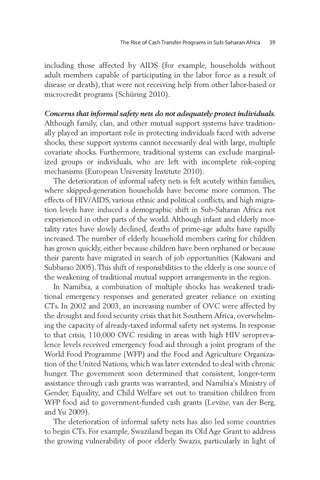The Rise of Cash Transfer Programs in Sub-Saharan Africa
39
including those affected by AIDS (for example, households without adult members capable of participating in the labor force as a result of disease or death), that were not receiving help from other labor-based or microcredit programs (Schßring 2010). Concerns that informal safety nets do not adequately protect individuals. Although family, clan, and other mutual support systems have traditionally played an important role in protecting individuals faced with adverse shocks, these support systems cannot necessarily deal with large, multiple covariate shocks. Furthermore, traditional systems can exclude marginalized groups or individuals, who are left with incomplete risk-coping mechanisms (European University Institute 2010). The deterioration of informal safety nets is felt acutely within families, where skipped-generation households have become more common. The effects of HIV/AIDS, various ethnic and political conflicts, and high migration levels have induced a demographic shift in Sub-Saharan Africa not experienced in other parts of the world. Although infant and elderly mortality rates have slowly declined, deaths of prime-age adults have rapidly increased. The number of elderly household members caring for children has grown quickly, either because children have been orphaned or because their parents have migrated in search of job opportunities (Kakwani and Subbarao 2005). This shift of responsibilities to the elderly is one source of the weakening of traditional mutual support arrangements in the region. In Namibia, a combination of multiple shocks has weakened traditional emergency responses and generated greater reliance on existing CTs. In 2002 and 2003, an increasing number of OVC were affected by the drought and food security crisis that hit Southern Africa, overwhelming the capacity of already-taxed informal safety net systems. In response to that crisis, 110,000 OVC residing in areas with high HIV seroprevalence levels received emergency food aid through a joint program of the World Food Programme (WFP) and the Food and Agriculture Organization of the United Nations, which was later extended to deal with chronic hunger. The government soon determined that consistent, longer-term assistance through cash grants was warranted, and Namibia’s Ministry of Gender, Equality, and Child Welfare set out to transition children from WFP food aid to government-funded cash grants (Levine, van der Berg, and Yu 2009). The deterioration of informal safety nets has also led some countries to begin CTs. For example, Swaziland began its Old Age Grant to address the growing vulnerability of poor elderly Swazis, particularly in light of
